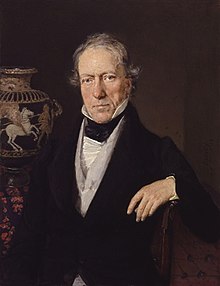William Martin Leake
William Martin Leake | |
|---|---|
 William Martin Leake portrayed by Christian Albrecht Jensen | |
| Born | 14 January 1777 Mayfair, London |
| Died | 6 January 1860 (aged 82) Brighton |
William Martin Leake
Life
Leake was born in London to John Martin Leake and Mary Calvert Leake. Following a family tradition, he joined the British
For much of the first decade of the nineteenth century, Leake was employed by the
In 1810 he was granted a yearly sum of £600 for his services in Turkey. In 1815 he retired from the army, in which he held the rank of colonel, devoting the remainder of his life to topographical and antiquarian studies.[3] He joined the learned Society of Dilettanti and became vice-president of the Royal Society of Literature.[1] He was admitted a Fellow of the Royal Society on 13 April 1815.[6]
He died in
Works
He authored:
- Researches in Greece (1814)
- The topography of Athens: With some remarks on its antiquities (1821)
- Journal of a tour in Asia Minor,: with comparative remarks on the ancient and modern geography of that country (1824)
- Travels in the Morea: With a map and plans (1830), and a supplement, Peloponnesiaca (1846)
- Travels in Northern Greece (1835)
- Numismata Hellenica (1854), followed by a supplement in 1859.[3]
His Topography of Athens, the first attempt at a systematic treatment, long remained an authority.[3]
Notes
- ^ a b c Goekoop 2010, p. 41.
- ^ Marsden 1864, p. 1.
- ^ a b c d e f Chisholm 1911.
- ^ McNeal 1993, p. 33.
- ^ Whitley 2001, p. 46.
- ^ "Lists of Royal Society Fellows". Retrieved 15 December 2006.
Sources
- This article incorporates text from a publication now in the public domain: Chisholm, Hugh, ed. (1911). "Leake, William Martin". Encyclopædia Britannica. Vol. 16 (11th ed.). Cambridge University Press. p. 329.
- Goekoop, Cees H. (2010). Where on Earth is Ithaca? A Quest for the Homeland of Odysseus. Utrecht: Eburon. ISBN 978-90-5972-344-3.
- Marsden, John Howard (1864). A brief memoir of the life and writings of the late Lieutenant-Colonel William Martin Leake. London: Printed by Whittingham and Wilkins for private circulation only.
- McNeal, R. A. (1993). ""Introduction"". In McNeal, R. A. (ed.). Nicholas Biddle in Greece: The Journals and Letters of 1806. State College: Pennsylvania State University Press. pp. 1–48. ISBN 978-0-271-03445-4.
- ISBN 978-0-521-62733-7.
Further reading
- the Architect for 7 October 1876
- Ernst Curtius in the Preussische Jahrbücher (September 1876)
- JE Sandys, Hist. of Classical Scholarship, iii. (1908), p. 442.
- J.M. Wagstaff, Colonel Leake in Laconia, in J.M. Sanders (ed), ΦΙΛΟΛΑΚΩΝ. Lakonian studies in honour of Hector Catling. (1992) Athens, 277–83.
- J.M. Wagstaff, Pausanias and the topographers. The case of Colonel Leake, in S.E. Alcock, J.F. Cherry, and J. Elsner (eds), Pausanias. Travel and memory in Roman Greece. (2001a) Oxford, 190–206.
- J.M. Wagstaff, Colonel Leake. Traveller and scholar. in S. Searight and M. Wagstaff (eds), Travellers in the Levant. Voyagers and visionaries. (2001b) Durham, 3–15.
- CL Witmore, On multiple fields. Between the material world and media: Two cases from the Peloponnesus, Greece, Archaeological Dialogues, (2004) 11(2), 133–164. link
- CL Witmore and TV Buttrey, William Martin Leake: a contemporary of P.O. Brøndsted in Greece and in London, in P.O. Brøndsted (1780–1842) – A Danish Classicist in his European context. Rasmussen, B.B., Jensen, J.S., Lund, J. and Märcher (eds) Historisk-filosofiske Skrifter (2008) 31, 15–34.
External links
- Travels in Northern Greece by William Martin Leake, online book. Includes Biography and Bibliography.[dead link]
